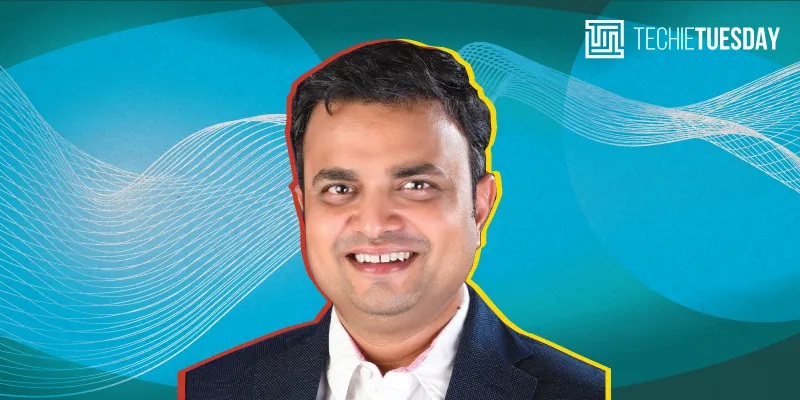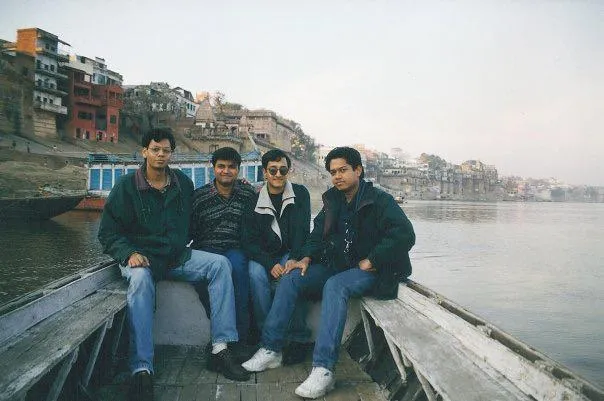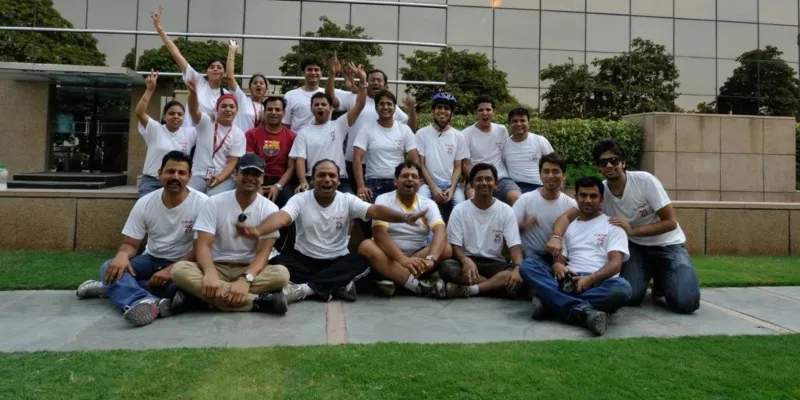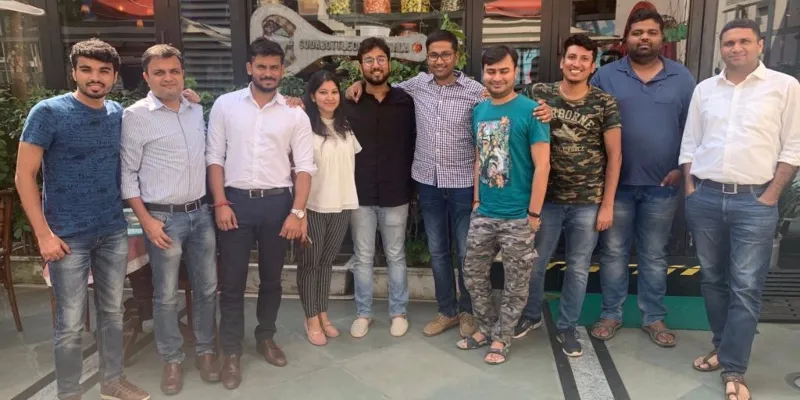[Techie Tuesday] From coding at 13 to building security systems - the journey of Praneet Khare, Co-founder, AvidSecure
This week, on Techie Tuesday, we feature Praneet Kare, Co-founder of Avid Secure, a cloud-based security company, which is now part of Sophos.
“How good a storyteller are you?” asks Praneet Khare, Co-founder, Avid Secure, a security startup that was recently acquired by Sophos, a global provider of network and end-point security.
A techie for several decades now, storytelling, says Praneet, is an important skill for all, especially techies.
“When you’re selling a product, you need to be able to tell a story to the customer. And as techies, you need to understand that at the end of the day, you are building the product for a consumer. So, tell the right story. And this holds true even for the engineers you are hiring,” says Praneet.
Praneet’s love to build products started very early, when he was just 13. At a time when most kids his age were playing video games, he created a small video game all by himself. And this interest to build products from scratch was also visible later in life.

Praneet Khare
In a conversation with YourStory, Praneet charts his journey from building something from scratch at SolidCore, a startup, to working with a giant like McAfee and his stint at InMobi, which led him to see success as an entrepreneur.
He says that working with larger companies like these made him understand the importance of building a product with a bigger picture in mind, and why one must understand the fundamentals and the market they’re going after.
Praneet, however, explains that his journey has just begun, and there still is a long way to go. And between his experiences in the corporate world and startups, Praneet says he will pick a startup any day.
Engineering - a childhood dream
Praneet, whose father was a BHEL hydro turbine engineer, spent most of his childhood in Haridwar in the gated BHEL community. He says that his love for engineering started in that very campus.
“In the BHEL campus, there was a bus service that would run up to Roorkee. I would stand in the balcony of my house and see the bus, and as a child, I always wanted to be a part of the bus and head to the big university at Roorkee,” says Praneet.
However, his first tryst with engineering happened during a ‘Vishwakarma’ day celebration at the BHEL factory. Praneet was simply fascinated with the lathe machine and fabrications of turbines. He would see his father work on the design of these machines - the big graphic computers - which completely fascinated him.
Praneet’s interest in building products was also visible when he created a small video game after completing a computer programming course at the age of 13. It was this interest that finally got him to join the place of his childhood dreams - the big university in Roorkee - University of Roorkee in 1993.
It is here that Praneet developed and built on his core fundamentals. He says his professor - Padam Kumar - would insist on it.
“Tech keeps changing, no matter what you do, but if your base is strong you can pick anything. In the final year of college, we built wireless CDMA, which was only in research papers in the 90s. We built the hardware and software for the receiver and transmitter to do wireless transfer,” says Praneet.
And soon, in 1997, under campus placement, he was placed at Hughes Software Systems.
A sneak-peek into the world of startups
Speaking about his time at Hughes Software, Praneet says, “We built different components in the telecommunications space, which we would sell to companies that had different needs. It was during this time that I was exposed to companies of different kinds and stages, and I came across different startups. I understood the challenges the startups faced while building the products,” says Praneet.
For Praneet, it seemed exciting and challenging at the same time, and he felt the need to do something similar and look into the space and see if he could build a product of his own. While there were a few ideas, he didn’t come up with anything significant then.

Praneet with the Hughes Software team at Haridwar
However, his desire to create something from scratch became a reality in 2004 when he joined SolidCore, a California and Gurugram-based startup, as part of the core team.
“SolidCore was my first step at building something from scratch. Till then, all the anti-viruses would work on the method of blacklisting, where I know the bad signatures and block them. The problem is unless you know the bad signatures, you can’t block out viruses. We thought of flipping the switch and decided that would work on a whitelist method, where we will let only the good signatures work,” explains Praneet.
But, in 2008, the company was acquired by McAfee, which in-turn got acquired by Intel.
Understanding from a larger giant
According to Praneet, the best part of being at McAfee was they let the team be independent.
“This helped us integrate into the McAfee team, and also build something of our own. We had become the McAfee India centre. It gave us the push, the momentum, and the speed we needed,” says Praneet.
Being a part of McAfee, Praneet understood the importance of building a product with a bigger picture in mind. He says that while the team understood what and how the products needed to be built, they also built it with an understanding of a few customers.

McAfee Days
But large enterprise clients operate differently. Citing an incident, Praneet says, “I remember a tough meeting with a CIO of a large enterprise. It was an eye-opener of sorts. We realised that while building a product, you really need to understand the market you’re going after. As a startup, it is important to have a fast turnaround and understand how intently you listen to the feedback from your potential customers, mentors, and even current customers. You cannot afford to be rigid.”
While McAfee gave Praneet the much-needed larger company expertise, he knew he had to get back into a startup-like environment. So, in 2015, he moved to InMobi, where he built the user and data platform.
Here, he would work on targeted advertising and focus on which user gets what kind of message so that the chances of opening an ad is higher. “The time you get the information of a user, to the time it is made available in the ad survey would take a couple of hours,” says Praneet.
The InMobi journey
InMobi had distributed data centres, and there was a hold where all correlations were made. The process would take a few hours. Praneet says that one of his first assignments was to change this into a screening mode.
“It was about building a real-time access to all the signals. So, what would take a couple of hours would now take just a few minutes. It was a user platform built on real-time intuition and decision making,” explains Praneet.
While his journey at InMobi was fascinating, Praneet decided to leave his cushy job as the head of data platform to start up again.
And this time, he decided to venture into the experiential travel space and started Rizort, a tech platform, with a couple of friends. The platform helped users experience a place beforehand online, and would also give them packages and travel options based on their needs.
“We built an VR and AR platform to understand the experiences better. We had curated destinations and experiences. But we realised that the market was too small, and the cost of the hardware was really high. There still was a long way to go, so I exited the company in 2017,” says Praneet.
Starting up again
After his first entrepreneurial stint, he decided to go back to the field that he felt passionate about – ‘Security’. And this led to the birth of his second startup - Avid Secure - which Praneet co-founded with his ex-colleagues and a few friends.
The startup focussed on helping people build and deploy their products on scale without worrying too much about security.
And in January this year, Avid Secure was acquired by Sophos. Praneet says that by the last quarter of 2018, they already had several Fortune 500 companies as their customers, who were giving them good traction. The team had just raised a small seed round.

The Avid Secure team
The team was also looking to raise Series A round of funding. “We were looking at a term sheet, but in the market the cloud security became a hot segment, primarily because of the breaches. So, large security companies started looking to pick up stake in smaller companies,” says Praneet.
And that is how Sophos came into the picture. When the companies started working together, they realised there was a sync. And after a couple of months, the acquisition closed. Sophos has now created a business unit around Avid, where they are working on a similar charter.
Are you a storyteller?
Praneet says, "A startup journey has a lot of ups and downs. It is your persistence and belief in the idea that keeps you going. There are days you wake up smiling and then there are days where you wake up wondering why I am doing this. What is important is you have people who are walking in this journey along with you, and they share the same passion, enthusiasm, and positivity. So that when you are feeling down, there are others who can lift you up. It is a belief in what you’re building that keeps you going.”
Today, while hiring a techie, Praneet says, he looks for the attitude and the aptitude of the techie. He says, unless you have the right kind of aptitude to understand the problems and look at different perspectives, it is hard to build a good solution. And the same applies to attitude - how hard are you willing to try?
Praneet says that while hiring, they ask open-ended questions to see what kind of questions the techie asks to understand the problem statement. And are they looking at different perspectives and alternatives. It is about how thorough one is.
Advising engineers and techies, Praneet says,
“Technology keeps changing and evolving. Understand the basic principles of the framework and what problems it can solve. You can then move from framework A to B very easily. Strengthen your fundamentals and nothing can stop you from building anything. Opportunities to grow and learn are everywhere, you just need to look. Also, do not disregard your gut feel.”
(Edited by Megha Reddy)


![[Techie Tuesday] From coding at 13 to building security systems - the journey of Praneet Khare, Co-founder, AvidSecure](https://images.yourstory.com/cs/2/a9efa9c0-2dd9-11e9-adc5-2d913c55075e/Techie-tuesday---Praneet-Khare-800x4001568037991910.png?mode=crop&crop=faces&ar=2%3A1&format=auto&w=1920&q=75)

![[Techie Tuesday] Meet VMware’s first woman software engineer who now helms the tech platforms t...](https://images.yourstory.com/cs/2/a9efa9c0-2dd9-11e9-adc5-2d913c55075e/Jenifer_Anderson_TechieTuesdays_2-011560176967790.png?fm=png&auto=format&h=100&w=100&crop=entropy&fit=crop)
![[Techie Tuesday] From building India’s first supercomputer to finding a non-invasive way of det...](https://images.yourstory.com/cs/2/a9efa9c0-2dd9-11e9-adc5-2d913c55075e/Techie-Tuesday-Geetha-Manjunath1560780626901.png?fm=png&auto=format&h=100&w=100&crop=entropy&fit=crop)
![[Techie Tuesday] From genetics to data science: Shantanu Bhattacharyya's many pit stops before ...](https://images.yourstory.com/cs/2/730b5070-2d6c-11e9-aa97-9329348d4c3e/Techie-tuesday-Shantanu-800X4001561994258371.png?fm=png&auto=format&h=100&w=100&crop=entropy&fit=crop)
![[Techie Tuesday] Sanjeev Barnwal of Facebook-backed Meesho has one advice for coders: ‘get out ...](https://images.yourstory.com/cs/2/a9efa9c0-2dd9-11e9-adc5-2d913c55075e/Sanjeev_800_4001562586046701.jpg?fm=png&auto=format&h=100&w=100&crop=entropy&fit=crop)
![[Techie Tuesday] The unlikely story of Gurteshwar Singh of Karix, a college dropout turned clou...](https://images.yourstory.com/cs/2/a9efa9c0-2dd9-11e9-adc5-2d913c55075e/Final_Gurteshwar-800x4001563200009185.png?fm=png&auto=format&h=100&w=100&crop=entropy&fit=crop)
![[Techie Tuesday] He began coding at 10 and went on to build blockchain-powered phones: meet Pun...](https://images.yourstory.com/cs/2/730b5070-2d6c-11e9-aa97-9329348d4c3e/Techie-tuesday--Pitt-Huang,-CTO,-Pundi-X1563805309282.png?fm=png&auto=format&h=100&w=100&crop=entropy&fit=crop)
![[Techie Tuesday] From selling his startup to Facebook to building ‘the mother of Alexa’ - Kumar...](https://images.yourstory.com/cs/2/730b5070-2d6c-11e9-aa97-9329348d4c3e/Techie-tuesday---kumar-rangarajan-800x4001566827494333.png?fm=png&auto=format&h=100&w=100&crop=entropy&fit=crop)